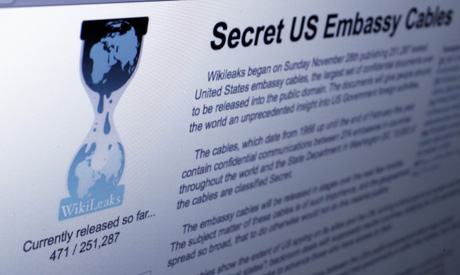
AP: The Internet homepage of Wikileaks is shown in this photo taken in New York, Wednesday, Dec. 1, 2010.
Top US officials have grown frustrated over the resistance of allies in the Middle East to help shut the financial pipeline of terrorists, the New York Times reported on Sunday, citing secret diplomatic dispatches.
Internal State Department cables, obtained by WikiLeaks and made available to news organisations, indicate that millions of dollars are flowing to extremist groups, including Al-Qaeda and the Taliban, despite US vows to cut off such funding.
A classified memo sent by US Secretary of State Hillary Clinton last December made it clear that residents of Saudi Arabia and its neighbours were the chief supporters of many extremist activities, the newspaper said.
"It has been an ongoing challenge to persuade Saudi officials to treat terrorist financing emanating from Saudi Arabia as a strategic priority," according to the cable cited by the newspaper.
It concluded that "donors in Saudi Arabia constitute the most significant source of funding to Sunni terrorist groups worldwide" and offered similarly critical views about other countries in the region. The United Arab Emirates was described as having a "strategic gap" that terrorists could exploit, while Qatar was seen as being "the worst in the region" on counterterrorism and Kuwait was dubbed "a key transit point".
The publication of the leaked US embassy cables, which began late last month, has embarrassed Washington as well as foreign governments. Clinton has sharply criticised the leaks but said they will not harm important US alliances.
The cables cited by the Times detailed a long list of methods that suspected terrorists are using to finance their activities, including a bank robbery in Yemen last year, drug activity in Afghanistan and the annual pilgrimages to Mecca.
One memo reported on a possible plot by Iranians to launder $5 billion to $10 billion through the UAE banks as part of a broader effort to "stir up trouble" among the Persian Gulf states, the Times said. The Clinton cable stressed a need to "generate the political will necessary" to block money to terrorist networks – groups she said were threatening stability in Pakistan and Afghanistan and targeting coalition soldiers, the Times said.
But foreign leaders have resisted US pressure for more aggressive crackdowns on suspected supporters of terrorism, according to the newspaper. In private meetings they have accused US officials of pursuing Arab charities and individuals in a heavy-handed manner and on thin evidence.
Although many State Department cables conclude Al-Qaeda generates money almost at will from wealthy individuals and sympathetic groups in the Middle East, they suggest there is little evidence of significant financial support in the United States or Europe for militants in Afghanistan and Pakistan.
"UK financing is important, but the real money is in the Gulf," a senior British counterterrorism official told a US Treasury Department official, according to a cable last year from the US Embassy in London, the Times reported.
Short link: